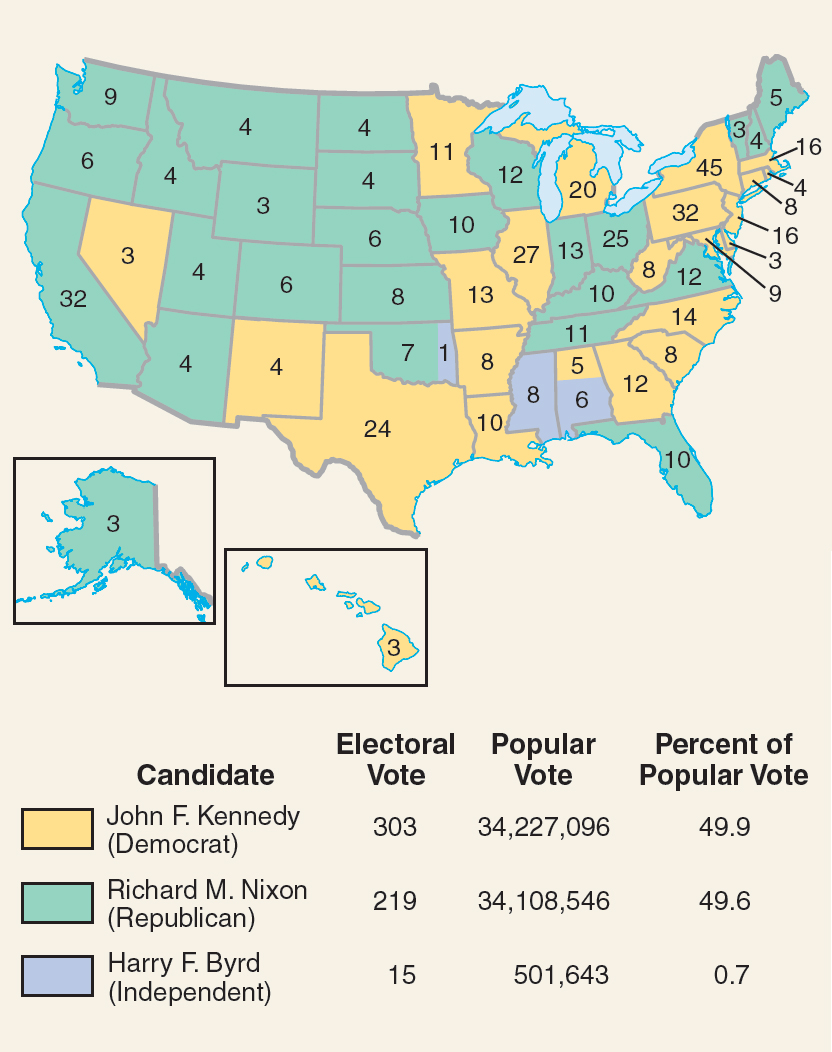The Unrealized Promise of Kennedy’s New Frontier
Printed Page 836
John F. Kennedy grew up in privilege, the child of an Irish Catholic businessman who became a New Deal official. Helped by a distinguished World War II navy record, Kennedy won election to the House of Representatives in 1946 and the Senate in 1952. With a powerful political machine, his family’s fortune, and a dynamic personal appeal, Kennedy won the Democratic presidential nomination in 1960. He stunned many Democrats by choosing as his running mate Lyndon B. Johnson of Texas, whom liberals disparaged as a typical southern conservative.
CHAPTER LOCATOR
What liberal reforms were advanced during the Kennedy and Johnson administrations?
How did the civil rights movement evolve in the 1960s?
What other rights movements emerged in the 1960s?
What were the goals of the new wave of feminism?
How did liberalism fare under President Nixon?
Conclusion: What were the achievements and limitations of liberalism?
 LearningCurve
LearningCurve
Check what you know.

In the general election, Kennedy narrowly defeated his Republican opponent, Vice President Richard M. Nixon, by a 118,550-vote margin (Map 28.1). African American voters contributed to his victory, and Kennedy also benefited from the nation’s first televised presidential debates, at which he appeared cool and confident beside a nervous and pale Nixon.
The Kennedy administration projected energy, idealism, and glamour, although Kennedy was in most ways a cautious, pragmatic politician. At his inauguration, he called on Americans to serve the common good. “Ask not what your country can do for you,” he implored, “ask what you can do for your country.” Although Kennedy’s idealism inspired many, he failed to persuade Congress to expand the welfare state with federal education and health care programs. Moreover, he resisted leadership on behalf of racial justice until civil rights activists gave him no choice.
Moved by the desperate conditions he observed while campaigning in Appalachia, Kennedy pushed poverty onto the national agenda. In 1962, he read Michael Harrington’s The Other America, which described the poverty that left more than one in five Americans “maimed in body and spirit, existing at levels beneath those necessary for human decency.” By 1962, Kennedy had won support for a $2 billion urban renewal program, providing incentives to businesses to locate in economically depressed areas and job training for the unemployed. In the summer of 1963, he asked aides to plan a full-scale attack on poverty.
Kennedy had promised to make economic growth a key objective, and he called for an enormous tax cut in 1963, which he promised would increase demand and create jobs. Passed in February 1964, the law contributed to an economic boom, as unemployment fell and the gross national product shot up. Some liberal critics of the tax cut, however, noted that it favored the well-off and argued instead for increased spending on social programs.
Kennedy’s domestic efforts were in their infancy when an assassin’s bullets struck him down on November 22, 1963. Within minutes of the shooting — which occurred as Kennedy’s motorcade passed through Dallas, Texas — radio and television broadcast the unfolding horror to the nation. Stunned Americans struggled to understand what had happened. Soon after the assassination, police arrested Lee Harvey Oswald and concluded that he had fired the shots from a nearby building. Two days later, while officers were transferring Oswald from one jail to another, a local nightclub operator killed him. Suspicions arose that Oswald was murdered to cover up a conspiracy by ultraconservatives who hated Kennedy or by Communists who supported Castro’s Cuba (as discussed in chapter 29). To get at the truth, President Johnson appointed a commission headed by Chief Justice Earl Warren, which concluded that both Oswald and his assassin had acted alone.
Kennedy’s domestic record had been unremarkable in his first two years, but his attention to taxes, civil rights, and poverty in 1963 suggested an important shift. Whether Kennedy could have persuaded Congress to enact them remained in question. Journalist James Reston commented, “What was killed was not only the president but the promise. … We saw him only as a rising sun.”